|
|
|
Sort Order |
|
|
|
Items / Page
|
|
|
|
|
|
|
| Srl | Item |
| 1 |
ID:
132083
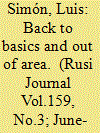

|
|
|
|
|
| Publication |
2014.
|
| Summary/Abstract |
As Allied combat forces return from Afghanistan, Russia's annexation of Crimea has reminded NATO that the security of a rules-based international system in Europe cannot be taken for granted. Efforts to reassure Allies and partners in Eastern Europe have thus become a top priority. This, however, should not lead the Allies to turn their backs on broader, global geostrategic developments - particularly at a time when Asia is emerging as the world's economic and geopolitical centre of gravity. If the West is to prosper in a changing world, argues Luis Simón, it should be able to both defend Europe and project security globally.
|
|
|
|
|
|
|
|
|
|
|
|
|
|
|
|
| 2 |
ID:
132711
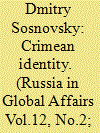

|
|
|
|
|
| Publication |
2014.
|
| Summary/Abstract |
Kiev's attempt to build an all-Ukrainian identity solely on the basis of the Ukrainian ethnos through political centralization, cultural unification, and forceful assimilation was a complete failure. Now, as part of the Russian Federation, which pursues an entirely different regional policy, Crimea has an opportunity to form its own regional identity.
|
|
|
|
|
|
|
|
|
|
|
|
|
|
|
|
| 3 |
ID:
130862
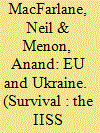

|
|
|
|
|
| Publication |
2014.
|
| Summary/Abstract |
EU members did not take long-standing Russian positions seriously, assumed any neighbour would be eager to sign up for 'more Europe', and have failed to generate a viable reply to Moscow's intervention. Events in Ukraine represent the most significant security crisis in Europe since the collapse of the Soviet Union. The Geneva accord of April this year, intended to secure de-escalation, has been violated by Russia, by 'local' forces in eastern Ukraine and, arguably, by the Ukrainian government itself. Russian Foreign Minister Sergei Lavrov has warned that Russia will defend its interests in eastern Ukraine, if necessary with attacks similar to those in Georgia in 2008. Small US deployments are occurring in the Baltics and Poland. Russia has resumed military exercises near the frontier with Ukraine. The escalatory dynamic is clear.
|
|
|
|
|
|
|
|
|
|
|
|
|
|
|
|
| 4 |
ID:
132698
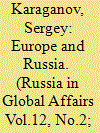

|
|
|
|
|
| Publication |
2014.
|
| Summary/Abstract |
Debates over the ongoing crisis in relations between Russia and the West revolve around the incorporation of Crimea, the global reaction to that move, and the future configuration of the Ukrainian state if, of course, it manages to survive (and I hope it will). But I contend that these are not the primary issues in global terms. There are other crucial questions. The first is what the European security system will be like. I repeat: the Old World was not allowed to withdraw from the Cold War, and now it may see a new round of tension. The second important question is whether Russia will be able to overcome the impasse in its development, in which it found itself after it restored statehood at the end of the 2000s. The third and closely linked question is whether Russia will wish to remain part - even an independent and very special partner - of Europe or will it opt for cultural-civilizational isolation and increasingly lean towards the East economically. It is obvious that Russia is firmly determined to change the rules of the game that have been dictated to it for the past twenty-five years. Unable and reluctant to toe the line, Russia has given up attempts to become part of the West.
|
|
|
|
|
|
|
|
|
|
|
|
|
|
|
|
| 5 |
ID:
131150
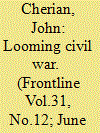

|
|
|
|
|
| Publication |
2014.
|
| Summary/Abstract |
Russia withdraws its troops from the border with Ukraine, but the latter rejects dialogue with the Russian-speaking people in the eastern region, claiming that military action is the only way to put down their revolt.
|
|
|
|
|
|
|
|
|
|
|
|
|
|
|
|
| 6 |
ID:
132699
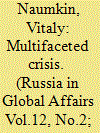

|
|
|
|
|
| Publication |
2014.
|
| Summary/Abstract |
The impact of the Ukrainian crisis on the existing world order proves to be so manifold that it is hard to predict its consequences, irrespective of its outcome. This short article touches upon only a few aspects of the problem.
|
|
|
|
|
|
|
|
|
|
|
|
|
|
|
|
| 7 |
ID:
102025
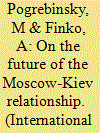

|
|
|
|
|
| Publication |
2010.
|
| Summary/Abstract |
SINCE THE COLLAPSE of the Soviet Union, Ukrainian-Russian relations have never been trouble free. After 1991, the Russian leadership headed by Boris Yeltsin assumed that sooner or later Ukraine would divide into several states.1 Whereby, until around mid-1993, the Russian establishment was more concerned with resolving Russia's domestic problems, while its foreign policy focused on relations with the U.S. and Western Europe. Harmonizing relations with the states that emerged in the Soviet Union's place was not a primary issue at first.
|
|
|
|
|
|
|
|
|
|
|
|
|
|
|
|
| 8 |
ID:
132697
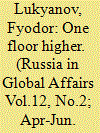

|
|
|
|
|
| Publication |
2014.
|
| Summary/Abstract |
It is already becoming habitual: yet another turn in world politics - and a fondly prepared portfolio of materials has to be shelved, and new ones made in an emergency mode. Witnessing epoch-making events is fascinating, but it takes a lot of nerve…
The period from February to April 2014 marked the sharpest turn in history since the end of the Cold War. We have witnessed the actual collapse of the Ukrainian statehood which emerged after the abolition of the Soviet Union, Crimea's entry into the Russian Federation, and an upsurge in confrontation between Moscow and the West. No wonder life made us revise our plans and devote the entire issue of Russia in Global Affairs to the changes which someone has already dubbed "Russian spring."
|
|
|
|
|
|
|
|
|
|
|
|
|
|
|
|
| 9 |
ID:
132455
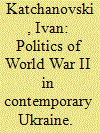

|
|
|
|
|
| Publication |
2014.
|
| Summary/Abstract |
This study examines the role of political factors in attitudes toward World War II in contemporary Ukraine. The research question is which factors determine public views of the principal warring sides and their leaders in Ukraine. The analysis of the 2012 Kyiv International Institute of Sociology survey shows that regional values, political party preferences, ethnicity, language, and age have significant effects on views of the Red Army and the Ukrainian Insurgent Army (UPA) during the war and attitudes toward the wartime activities of Joseph Stalin and Roman Shukhevych. Public perceptions of the German Army and Adolf Hitler in Ukraine do not vary much across regions, political parties, and ethnic, language, age, and sex groups.
|
|
|
|
|
|
|
|
|
|
|
|
|
|
|
|
| 10 |
ID:
128840
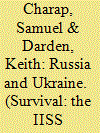

|
|
|
|
|
| Publication |
2014.
|
| Summary/Abstract |
The West has often assumed that Russia is inherently hostile to Ukraine, and the Marchevents seem to validate that assumption. But Moscow's moves are in fact a realdeparture from previous Russian policy.
In his book The Clash of Civilizations and the Remaking of World Order, Samuel Huntington makes the case for the utility of an external enemy in maintaining a coherent US national identity. 'For self-definition and motivation, people need enemies', he wrote.1 His thesis has been widely discredited. But recent developments in Ukraine seem to have partially validated the claim, and given it a new dimension. After 25 years of the West treating Russia as an enemy in Ukraine, Moscow might have really become one. Even prior to recent events, the depiction of Russian policy in Ukraine as nefarious has always, of course, held a kernel of truth. Russia's actions there since the Soviet collapse have been far from constructive and transparent. And the rhetoric of senior officials - in a particular notorious example, Vladimir Putin himself questioned whether Ukraine was a real country in a private moment with George W. Bush - has at times been inflammatory, subversive or incendiary.
But until the collapse of the EU-brokered political settlement on 21 February, Russia's actions in Ukraine had never merited the labels usually ascribed to them: expansionist, neo-imperial, neo-Soviet, aggressive, and so on. Indeed, until that watershed moment, it would have been wrong to attribute any significant development in Ukraine's recent political crisis to Russia. Yes, in the autumn of 2013 Russia did use economic levers to demonstrate to President Victor Yanukovich the costs of proceeding with the proposed Association Agreement with the EU. But it was Yanukovich, at the end of the day, and not Putin, who decided to make the shift - and it is unlikely that the Ukrainian president was serious about implementing the agreement in the first place. Even so, Russia's levers in Ukraine are entirely of the Ukrainians' making. If Yanukovich or any of his predecessors had spent less time getting rich off the gas trade with Russia, and more time implementing a comprehensive energy-efficiency policy (Ukraine has one of the world's highest rates of energy consumption per unit of GDP), creating a domestic gas market and forging an investment climate conducive to the development of Ukraine's own gas reserves, Moscow would not have had any significant economic leverage. The effectiveness of economic coercion in this case is no credit to Russia's strength; rather, it is a reflection of the utter failure of the Ukrainian elite to reform the country's economy.
|
|
|
|
|
|
|
|
|
|
|
|
|
|
|
|
| 11 |
ID:
131190
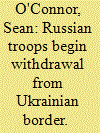

|
|
|
|
|
| Publication |
2014.
|
| Summary/Abstract |
Russian forces close to Ukraine's border appear to be drawing down or relocating, HIS Jane's satellite imagery analysis indicates
|
|
|
|
|
|
|
|
|
|
|
|
|
|
|
|
| 12 |
ID:
168088
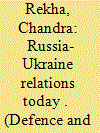

|
|
|
| 13 |
ID:
130861
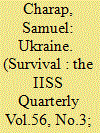

|
|
|
|
|
| Publication |
2014.
|
| Summary/Abstract |
The ugly truth is that Moscow can still undermine any Western plan for Ukraine's future. The crisis is likely to lead to a period of sustained disequilibrium and instability. As Ukraine's winter of domestic discord transformed into a spring of territorial partition and instability, European and American officials seemed to be speaking from an agreed set of talking points in their public remarks on the crisis. While hopeful transatlanticists sought to construe this remarkable consistency as a demonstration of a new seriousness of purpose in the West, the litany of warnings, threats and prescriptions for resolution (inevitably characterised as either an 'off-ramp' or 'de-escalation') spoke more to the desperation of those uttering them to quickly find a new, stable equilibrium for Ukraine, Russia and the international system. Yet the talking points and buzzwords, no matter how many times they are repeated, do not in fact describe either a sustainable equilibrium or an end point to the crisis. Instead, the disequilibrium and instability of the Ukrainian crisis seem likely to endure for some time: the search for a 'new normal' promises to be long, costly and highly disruptive of both individuals' lives and the international order.
|
|
|
|
|
|
|
|
|
|
|
|
|
|
|
|
| 14 |
ID:
130858
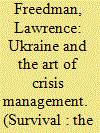

|
|
|
|
|
| Publication |
2014.
|
| Summary/Abstract |
Crisis management is the most demanding form of diplomacy. So far neither Russia nor the US and its European allies have handled it particularly well. Half a century ago, after the conflicts over Berlin and Cuba, a new term of art came into vogue: 'crisis management'. American Secretary of Defense Robert McNamara was even quoted as saying that crisis management had taken over from strategy.1 A small literature came to be devoted to the subject. In a number of respects, the term and the key themes it invoked were behind much of the debate on security policy for the remainder of the Cold War.2
The term 'crisis' comes from a Greek word indicating choice or decision, and came to refer to the turning point in a disease. The crisis was the moment when the fever reached a peak and the patient was either going to get a lot worse or a lot better. It is the moment usually marked in TV dramas by delirious patients, caring nurses, anxious relatives and lots of patting down of sweating foreheads with cold sponges. The idea of an international crisis has the same sense of stress and urgency. It means a conflict has come to a head, normally because one side has taken a bold but provocative initiative. At the moment of crisis, some big, long-standing conflict is about to be resolved, either through last-minute diplomacy or by force. The drama comes from a deadline, perhaps reinforced by an ultimatum, and intense media attention. On the news channels, the moment is usually marked by late nights in the corridors of power, emergency summits and tense United Nations Security Council meetings, while staying on the alert for military mobilisations and movements. Leaders of major powers would be expected to show that they had the temperament and character for a crisis. A steely resolve and calm judgement would be at a premium. This was the point of Hillary Clinton's famous challenge to candidate Barack Obama in 2008 as to how he would cope when 'it's 3 a.m. and your children are safe and asleep. But there's a phone in the White House and its ringing. Something's happening in the world.
|
|
|
|
|
|
|
|
|
|
|
|
|
|
|
|
| 15 |
ID:
132469
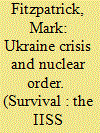

|
|
|
|
|
| Publication |
2014.
|
| Summary/Abstract |
On some issues, particularly Iran, the fallout has been negligible, yet there is still reason for concern. The gravest dangers are the devaluing of security assurances and cracks in the credibility of extended deterrence.
In the immediate aftermath of Russia's annexation of Crimea, gloomy predictions for the non-proliferation agenda were a commentariat staple. On some issues, particularly Iran, the fallout has so far been marginal. Yet there remains ample reason for concern, including over US-Russia cooperation on nuclear security. The gravest proliferation danger stemming from the crisis is the devaluing of security assurances of the kind provided to Ukraine in the 1994 Budapest Memorandum on Security Assurances and potential cracks in the credibility of extended deterrence.
|
|
|
|
|
|
|
|
|
|
|
|
|
|
|
|
|
|
|
|
|